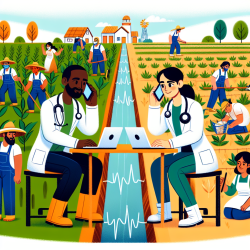Introduction
The US-Mexico border region is a unique area where health, socioeconomic, and political challenges converge, particularly for migrant and seasonal farmworkers. These workers face a myriad of health hazards and occupational risks, including high rates of chronic diseases and work-related injuries. The research article "The US/Mexico Border: A Binational Approach to Framing Challenges and Constructing Solutions for Improving Farmworkers’ Lives" provides insights into these issues and proposes a binational approach to address them.
Key Findings and Implications for Practitioners
The research highlights the importance of understanding the demographic and health profiles of farmworkers on both sides of the border. It emphasizes the need for improved health policies and practices that take into account the unique challenges faced by this population. Here are some key takeaways for practitioners:
- Comprehensive Health Assessments: Practitioners should conduct thorough health assessments that consider both physical and mental health aspects, including stress and depression, which are prevalent among farmworkers.
- Culturally Sensitive Interventions: Develop interventions that are culturally sensitive and tailored to the specific needs of farmworkers, considering their socioeconomic background and migration status.
- Binational Collaboration: Engage in binational collaborations to create a cohesive approach to farmworker health, leveraging resources and expertise from both the US and Mexico.
- Policy Advocacy: Advocate for policies that improve working conditions, access to healthcare, and social services for farmworkers, ensuring they receive the support they need.
Encouraging Further Research
While the research provides a solid foundation, there is a need for further studies to deepen our understanding of the health challenges faced by farmworkers. Practitioners are encouraged to engage in research initiatives that explore the following areas:
- Longitudinal Studies: Conduct longitudinal studies to track health outcomes over time and identify long-term health trends among farmworkers.
- Impact of Policy Changes: Investigate the impact of recent policy changes on farmworker health and well-being, particularly in light of evolving immigration laws.
- Innovative Health Solutions: Explore innovative health solutions, such as telehealth services, to improve access to care for farmworkers in remote areas.
Conclusion
By implementing the outcomes of this research and engaging in further studies, practitioners can significantly enhance their skills and contribute to improving the lives of farmworkers. A binational approach, coupled with targeted interventions and policy advocacy, holds the potential to address the complex challenges faced by this marginalized population.
To read the original research paper, please follow this link: The US/Mexico Border: A Binational Approach to Framing Challenges and Constructing Solutions for Improving Farmworkers’ Lives.










